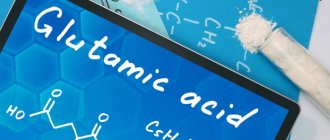GABA is a dietary supplement that promotes positive brain activity to reduce anxiety, insomnia, and stress reactions.
Most people have never even heard of the existence of gamma-aminobutyric acid (GABA), let alone the effects it has on the human body.
However, for those who suffer from anxiety or debilitating insomnia, this important brain hormone (scientifically called a neurotransmitter) may play a key role in reducing the symptoms of these diseases.
In fact, many medications that are used to treat neurological disorders work by activating GABA in the brain.
For example, a group of pharmacological drugs known as benzodiazepines and used to treat anxiety conditions increase the activity of GABA receptors; As a result, nerve transmission slows down and anxiety decreases.
Anti-insomnia medications, such as Ambien, also increase the activity of GABA, resulting in a sedative effect that helps combat this common condition.
role in a variety of serious medical problems is now becoming increasingly clear , such as:
- attention deficit disorder due to general hyperactivity;
- insomnia;
- depression;
- anxiety states;
- premenstrual syndrome;
- inflammatory reactions.
It appears that GABA may also increase growth hormone levels, which may reduce the risk of heart disease, increase muscle strength, and help fight excess weight.
More about GABA
Gamma-aminobutyric acid, also known as GABA, is a neurotransmitter that connects the brain and nervous system.
It is produced in brain tissue from glutamate. This process is catalyzed by the active form of vitamin B6 and the enzyme glutamate decarboxylase (GAD).
The main function of GABA is to reduce activity processes in nerve cells. A fair amount of new research has shown that GABA may play a role in many pathological conditions, including depression, anxiety and stress.
Gamma-aminobutyric acid is believed to have a natural calming effect; it reduces feelings of anxiety and fear by directly reducing the excitability of neurons.
As a dietary supplement, GABA is often used to improve sleep, mood, and relieve premenstrual symptoms.
Beneficial properties of gamma-aminobutyric acid
Relieves anxiety
One of the main functions of GABA is to reduce nervous excitability, which can lead to feelings of anxiety and fear. GABA has a calming effect on the central nervous system and is often used as a natural remedy to reduce anxiety. In fact, some anxiety disorders are associated with decreased levels of GABA in the human brain.
A scientific study published in the American Journal of Psychiatry showed that patients suffering from anxiety disorders, characterized by inexplicable panic attacks, had impaired GABA metabolism. ()
Another study conducted by the Department of Psychiatry at Columbia University College of Physicians and Surgeons found that patients with panic attacks and a family history of mood disorders had decreased levels of GABA in their brain tissue. ()
In addition to the GABA supplement, there are many other natural remedies for reducing anxiety reactions; these include - meditation, essential oils, valerian root - a plant that helps increase GABA levels with a subsequent decrease in nervous activity.
Improves sleep
Insomnia is a condition characterized by difficulty falling asleep. It affects approximately 30 percent of adults worldwide. ()
With its calming, relaxing effects, GABA may help naturally induce sleep by reducing overall nervous excitability. ()
One scientific study conducted in 2015 found that taking GABA helped its participants fall asleep faster, reducing the amount of time it took to fall asleep by an average of five minutes. ()
Additionally, there is a high possibility that individuals who suffer from insomnia may have lower levels of GABA in their brain tissue. A scientific study published in the journal Sleep in 2008 found that GABA levels were 30 percent lower in insomnia patients compared to controls. ()
In addition to using a GABA supplement, maintaining a regular bedtime routine, limiting caffeine intake, and taking magnesium to improve GABA metabolism will all help improve sleep.
Reduces depression
In addition to preventing anxiety and regulating sleep, the neurotransmitter GABA is thought to play a central role in depression. Research has shown that patients with depression tend to have lower levels of GABA than healthy people. ()
Gamma-aminobutyric acid levels may increase after treatment for depression. One study conducted by the Department of Psychiatry at Yale University School of Medicine found that patients who received electroconvulsive therapy to treat depression showed increased levels of GABA after treatment. () Due to its antidepressant effect, the GABA dietary supplement may be a good alternative to traditional treatments for depression. (, )
Other natural remedies for treating depression include changing your diet, exercising, and providing your body with the right amount of vitamin D.
Relieves symptoms of premenstrual syndrome
Premenstrual syndrome, or PMS, is a group of symptoms such as mood swings, fatigue and certain food habits that women experience each month between ovulation (the release of an egg from the ovaries) and the start of menstrual bleeding. Research shows that the stability of GABA levels is negatively affected by menstrual cycles, resulting in a monthly decrease in GABA concentrations in brain tissue in women of reproductive age. ()
GABA may help relieve PMS symptoms. For example, some studies have suggested that it may act as a natural pain reliever, while others have noted that GABA may be involved in complex mechanisms that cause seizures. (, )
Messara berries, grown on the island of Crete, vitamin B6 and magnesium are also natural remedies for treating PMS, they help balance a woman's hormonal levels and reduce painful symptoms.
Reduces inflammation reactions
Although the inflammatory response is a normal response caused by the immune system as a result of illness or injury, chronic inflammation can contribute to the development of many diseases, such as heart disease, arthritis and even cancer. Some studies have shown that gamma-aminobutyric acid can reduce inflammation and may therefore be useful in treating these disorders.
For example, an animal study from UCLA found that supplementing mice with GABA reduced the risk of developing rheumatoid arthritis in healthy mice and led to a reduction in arthritis symptoms in diseased mice. () In addition, another review in the Journal of Neuroinflammation showed that GABA reduces the activity of pathophysiological reactions leading to the formation of arthritis. ()
Including anti-inflammatory foods in your diet helps reduce the inflammatory response. Leafy green vegetables, berries, salmon and walnuts significantly reduce the severity of any type of inflammation, and may be helpful in addition to taking a GABA supplement.
Improves focus in attention deficit disorder due to general hyperactivity
Attention deficit hyperactivity disorder, commonly known as ADHD, is a disorder that affects not only children but also adults; it is characterized by limited attention, impulsivity and hyperactivity. GABA is sometimes used to improve focus and reduce common symptoms in individuals with attention deficit disorder due to generalized hyperactivity.
A 2012 study from the Johns Hopkins University School of Medicine compared GABA concentrations in children with and without ADHD and found that GABA concentrations in the brain were reduced in children with ADHD. ()
Another study found that lower GABA levels were associated with greater impulsivity and decreased response inhibition. ()
Taking a GABA dietary supplement, alone or in combination with traditional treatments, may help reduce the symptoms of ADHD and ADHD naturally.
By following a specially designed diet for patients with attention deficit disorder and generalized hyperactivity, using other natural remedies to treat the disease, many patients achieve visible positive results.
Increases growth hormone levels
Human growth hormone is produced by cells of the pituitary gland; it stimulates an increase in muscle mass, reduces the risk of heart disease, improves body composition and helps strengthen bone tissue. A deficiency of this important hormone can lead to slower growth and puberty in children, depression, sexual dysfunction, insulin resistance, and an increased risk of heart disease in adults.
Scientific research shows that adding gamma-aminobutyric acid to the diet can increase growth hormone levels. So in one of them, conducted in 2008, 11 men received either three grams of GABA per day or placebo pills that did not contain GABA; afterward, they participated in strength training or rested. Those participants who received the GABA supplement showed a 400 percent increase in growth hormone levels at the end of the experiment. ()
High-intensity exercise along with the use of natural supplements such as L-glutamine and L-arginine also help to naturally increase growth hormone levels.
Possible risks and side effects
GABA is safe for most people; however, only some patients may occasionally experience side effects.
You should not take GABA during pregnancy or breastfeeding as the effects of GABA have not been studied in these groups. Additionally, if you are already taking medications to treat depression, anxiety, or insomnia, you should discuss the use of GABA with your doctor, as it may interfere with or change the activity of your prescribed medications.
There are reviews from some patients indicating an increase in anxiety and depressive episodes with the use of high doses of GABA. Other side effects include skin tingling and redness.
Prices
View the current price and the history of its changes.
Now Foods, GABA, 500 mg, 100 Vegetarian Capsules ★★★★★
623 rub. Retrieved 01/28/2022
Buy
Schedule of changes Starting from 08/12/2021
Statistics
| Current | 623 rub. | 28.01.2022 |
| Maximum | 632 rub. | 17.12.2021 |
| Minimum | 557 rub. | 29.10.2021 |
Last changes
| 623 rub. | 28.01.2022 |
| 608 rub. | 21.01.2022 |
| 606 rub. | 14.01.2022 |
| 595 rub. | 07.01.2022 |
| 632 rub. | 17.12.2021 |
Butyric acid as an alternative to GABA
Given the evidence available to date (and what remains unsolved), the research community has not yet reached a consensus regarding the acceptability and risks of GABA supplements.
In a recent review () of the effectiveness of GABA supplements, the authors noted the following:
“There is some evidence to support the calming effects of GABA supplements, but most of this evidence was reported by researchers with potential conflicts of interest.”
Also, these researchers did not report the side effect profile of the GABA supplements produced by their companies. Over time, these gaps in research independence can be filled.
However, for now it is safer to say that GABA is a biologically active molecule and in any tissue with which it comes into contact, a certain number of side effects from taking this supplement are possible.
Depending on the intended application, Butyric Acid may be a suitable alternative to GABA supplementation for patients with gastrointestinal and neurological disorders ().
Like GABA, butyric acid is a physiological molecule that the body creates in large quantities for a variety of purposes.
Like GABA, butyric acid acts as a neurotransmitter in the central nervous system.
Unlike GABA, butyric acid is primarily restricted to the gut, where it acts as a source of nutrients for the microbiome and behaves as a regulator of immune cells and genes targeting oxidative stress, with neurotransmitter activity occurring as a tertiary function.
The effect of butyric acid on the nervous system is still being actively studied. However, based on the available data, it is characterized by much less uniform inhibitory effects inherent in GABA. Instead, butyric acid acts as an activity modulator, preventing conditions of over- or under-excitability.
Additionally, increasing the brain's ability to compensate for oxidative stress means that butyric acid may also be widely used in the treatment of other diseases such as Parkinson's disease and Alzheimer's disease.
Under these conditions, the researchers found very high levels of neuro-oxidative stress, which causes inflammation. There is an incredibly complex relationship between neural inflammation and loss of function. However, scientists agree that inflammation in the brain should be limited.
Complex butyric acid supplements are now a potential treatment for reducing inflammation in the patients described above. Further research will likely further expand the scope of application of this substance.
These numerous features have a wide range of potential health benefits.
For example, scientists hypothesize that healthy gut flora will lead to less arousal in the gut-brain connection, which is associated with chronic anxiety and depression.
In the case of patients with autism spectrum disorder, reducing gut-brain arousal and reducing neuro-oxidative stress can impact a wide range of characteristic symptoms, including providing a more stable basis for behavior ().
In people with inflammatory bowel disease, reducing the bowel's propensity to become inflamed may reduce the frequency and severity of flare-ups, and healthy gut flora may help reduce symptoms of irritable bowel syndrome as a result of the beneficial effects of butyric acid on intestinal motility ().
In addition to all of the above, increasing the brain's ability to compensate for oxidative stress means that butyric acid can also be widely used in the treatment of other diseases, such as Parkinson's disease and Alzheimer's disease (), which are associated with high levels of oxidative stress and therefore inflammation.
Notably, the side effect profile of butyric acid is benign.
Typically, patients report only mild stomach discomfort.
However, many people who take butyric acid supplements find that the reduction in GI inflammation results in relief from constipation.
A large clinical trial is awaiting the effectiveness of butyric acid in a range of conditions—another major difference from GABA supplements.
It is important to note that butyric acid does not prevent intestinal immunocytes from responding to potential threats such as GABA supplements, since the amount of inhibition that butyric acid can cause in immunocytes is limited.
Notably, there are now comprehensive supplements designed to optimize bioavailability, allowing users to experience the full benefits of butyric acid.
Analogs
A GABA supplement can be replaced with a medication that has a sedative effect. The best analogues include the following drugs:
- Phenibut. It is a GABA-b receptor agonist. The active ingredient is γ-amino-β-phenylbutyric acid hydrochloride. The drug is available without a prescription and can be given to children from 2 years of age.
- Pantogam. This is a nootropic that contains calcium hopantenate. Children can take this drug from 3 years of age. It is used in the treatment of severe psychiatric disorders, epilepsy, and organic brain lesions.
- Picamilon. Another GABA-b receptor agonist. This drug is used for cerebrovascular accidents.
- Glycine. Improves brain activity and reduces psycho-emotional stress. The active ingredient is glycine.
- Gammalon. This drug can replace any other GABA-based dietary supplements.
GABA dosage
GABA dosages may vary depending on age, gender, and weight. Before you start taking a dietary supplement, it is a good idea to consult with your healthcare professional to determine if GABA is right for you and at what dose it will be most beneficial for your health.
The usual dosage for easing the stress response is about 750-800 milligrams per day , divided into three to four doses.
To reduce anxiety, some doctors recommend taking 250 milligrams to 650 milligrams of GABA three times daily, for a daily dose of 750 to 1,950 milligrams.
To reduce symptoms of attention deficit hyperactivity disorder, it is best to take 250 to 400 milligrams of GABA three times daily (up to 1,200 milligrams per day).
It is best to start using gamma-aminobutyric acid with a lower dose, gradually increasing its daily amount; This will help you understand how well you tolerate this dietary supplement and what dosage is most appropriate for your condition. If any negative side effects occur, reduce your dosage immediately and make an appointment with your doctor if your symptoms persist despite this.
Sources[edit | edit code]
- Atkins, Robert. Dr. Atkins' Vita-nutrient solution. Simon & Schuster. Page 176
- Private communication with F. Petty MD October 7, 2004
- Acta Endocrinol (Copenh). 1980 Feb;93(2):149-54 Effect of acute and repeated administration of gamma aminobutyric acid (GABA) on growth hormone and prolactin secretion in man. Cavagnini F, Invitti C, Pinto M, Maraschini C, Di Landro A, Dubini A, Marelli A.
- J Clin Endocrinol Metab. 1980 Oct;51(4):789-92. Effect of gamma-aminobutyric acid on growth hormone and prolactin secretion in man: influence of pimozide and domperidone. Cavagnini F, Benetti G, Invitti C, Ramella G, Pinto M, Lazza M, Dubini A, Marelli A, Muller EE.
- Medicine & Science in Sports & Exercise: Volume 35(5) Supplement 1 May 2003 p S271 THE EFFECTS OF GAMMA AMINOBUTYRIC ACID ON GROWTH HORMONE SECRETION AT REST AND FOLLOWING EXERCISE POWERS, M E.1; Borst, S E.1; McCoy, S C.1; Conway, R1; Yarrow, J1
- Powers ME, Yarrow JF, McCoy SC, Borst SE. Growth hormone isoform responses to GABA ingestion at rest and after exercise. Med Sci Sports Exerc. 2008 Jan;40(1):104-10.
- [https://www.ncbi.nlm.nih.gov/pmc/articles/PMC4772032/ 2.1.5. Vitamin B6 (Pyridoxine, Pyridoxal, Pyridoxamine), B Vitamins and the Brain: Mechanisms, Dose and Efficacy—A Review David O. Kennedy »]
Rating of the best Gaba supplements
Now Foods
The Now Foods brand produces a vegetarian, gluten-free product. The production has passed strict GMP certification. One capsule contains 750 mg of the supplement.
- 750 mg supplement per capsule
- affordable price
- suitable for vegetarians
- 100% quality guarantee
Manufacturer
Now Foods is a large American manufacturer that produces a wide range of dietary supplements at an affordable price. The production has passed GMP certification, and the ingredients are USDA certified, confirming the absence of GMOs.
Thorne Research
Thorne Research produces a GABA supplement called "PharmaGABA", the very name of which indicates an improved formula.
- 100 mg supplement per capsule
- capsules are easy to swallow
- vegan product
- improved formula
- natural product
Manufacturer
Thorne Research is an American manufacturer specializing in high-tech supplements and a supplier to the US Olympic team. The company has been producing sports supplements for over 30 years.
Country Life
Country Life produces a GABA supplement designed to relieve stress. This supplement is called "Gaba Relaxer" and contains, in addition to GABA, niacin, vitamin B6, taurine, inositol and glycine. Vitamin B6 is especially beneficial in this supplement as it improves the absorption of GABA.
- 200 mg GABA
- 200 mg niacin
- 20 mg vitamin B6
- 600 mg taurine
- 600 mg inositol
- 400 mg glycine
- quickly absorbed
- enhanced formula
- vegetarian and kosher product
Manufacturer
Country Life is one of the leaders in the natural nutritional supplement industry in the United States and has been in business since 1971. The fashionable, high-tech company is based in New York.
What products contain
To obtain GABA from foods, you do not need to follow any special diet. Many foods high in gamma-aminobutyric acid are present in the normal diet of residents of the CIS countries, so you won’t have to change your preferences much. GABA is mainly found in foods of plant origin. Among the most common I can highlight the following (in descending order):
- Tomatoes.
- Mackerel.
- Pickled vegetables (especially legumes after fermentation).
- Potato.
- Grapefruits.
- Sprouted rice.
- Broccoli.
- Eggplant.
- Peaches, oranges, pumpkin.
- Carrot.
- Beet.
To understand: tomatoes contain about 60-64 mg of GABA per 100 grams of product, peaches and kiwis - from 11 to 13. Beets - 4 mg. The richest source of gamma-aminobutyric acid is considered to be “gaba tea”, or Gabarone. The concentration of GABA in it can reach from 150 to 400 mg per 100 grams. But I want to note that you cannot get the same amount of GABA from tea as from tomatoes, which you can eat a lot without harm to your health.











